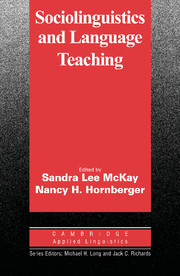Book contents
- Frontmatter
- Contents
- List of contributors
- Series editors' preface
- Preface
- Acknowledgements
- Part I LANGUAGE AND SOCIETY
- Part II LANGUAGE AND VARIATION
- Part III LANGUAGE AND INTERACTION
- Part IV LANGUAGE AND CULTURE
- 11 The ethnography of communication
- 12 Speech acts
- 13 Literacy and literacies
- CONCLUSION
- Index
11 - The ethnography of communication
Published online by Cambridge University Press: 22 July 2009
- Frontmatter
- Contents
- List of contributors
- Series editors' preface
- Preface
- Acknowledgements
- Part I LANGUAGE AND SOCIETY
- Part II LANGUAGE AND VARIATION
- Part III LANGUAGE AND INTERACTION
- Part IV LANGUAGE AND CULTURE
- 11 The ethnography of communication
- 12 Speech acts
- 13 Literacy and literacies
- CONCLUSION
- Index
Summary
Dell Hymes's call for an ethnography of speaking (1962; later to become more broadly the ethnography of communication) resulted in the advent of a distinctive new subdiscipline, derived from anthropology and linguistics, which has revolutionized the study of the interpenetration of language and culture. This new field focuses on the patterning of communicative behavior as it constitutes one of the systems of culture, as it functions within the holistic context of culture, and as it relates to patterns in other cultural systems. A primary aim of the ethnographic approach to the study of communicative activity is to provide a framework for the collection and analysis of descriptive data about the ways in which social meaning is conveyed, constructed, and negotiated. Its goals are, at least in the first instance, descriptive, guided by the conviction that information about diverse “ways of speaking” in different human societies is a legitimate contribution to knowledge in its own right. Nevertheless, the potential significance of the ethnography of communication goes far beyond a mere cataloging of facts about communicative behavior. Ultimately, its approach and findings are essential for the formulation of a truly adequate universal theory of language and human behavior.
As a blend of scientific and humanistic approaches, the ethnography of communication has two foci: particularistic and generalizing.
- Type
- Chapter
- Information
- Sociolinguistics and Language Teaching , pp. 351 - 382Publisher: Cambridge University PressPrint publication year: 1995
- 9
- Cited by

